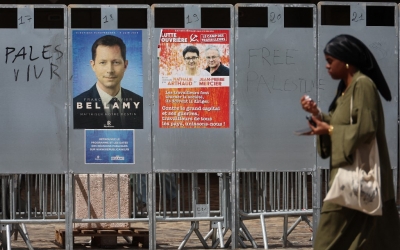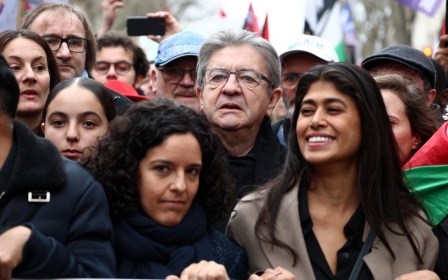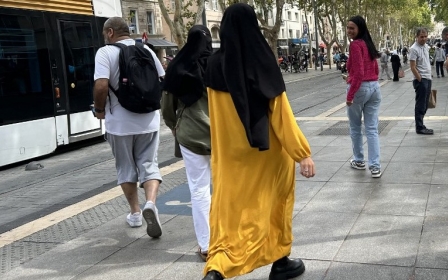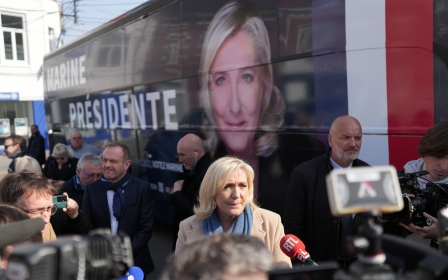France elections: Muslims fear ‘a disaster’ if the far right wins
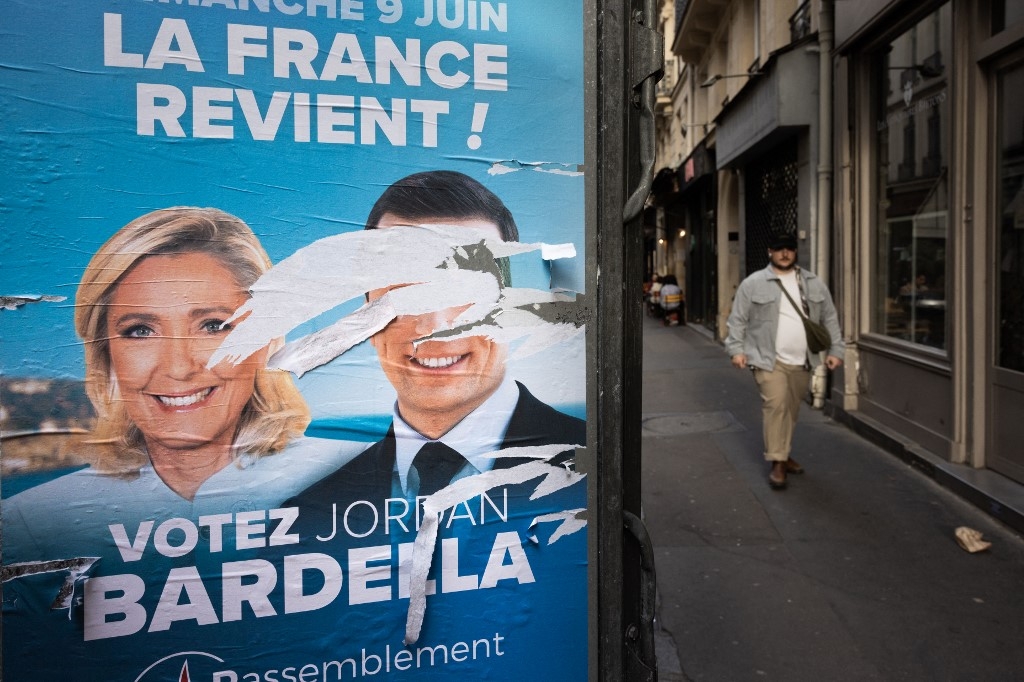
Soukayna Ribahi, a 56-year-old French-Moroccan woman living in Evry-Courcouronnes, 30km south of Paris, remembers very well what Jordan Bardella, the big winner of Sunday's European elections, said about the Islamic veil in 2023.
Commenting on a request by Les Hijabeuses, a group of Muslim athletes, to keep their headscarves on during sports competitions, the 28-year-old senior leader of the far-right National Rally (RN) was unequivocal: “In France, women do not wear the veil.”
Since then, the RN has stepped up a political grade. The third-largest party in the National Assembly, the lower house of parliament, the RN just won the European elections in France with 31.8 percent of the ballot.
That stunning result prompted President Emmanuel Macron to dissolve the National Assembly, with snap elections set for the end of the month. Now, the RN could achieve an equally resounding victory and form the first far-right government of France’s post-World War II history.
“If the RN comes to power, for sure the party will start by removing the veil,” Soukayna told Middle East Eye in front of Evry-Courcouronnes's grand mosque after afternoon prayer on Tuesday.
New MEE newsletter: Jerusalem Dispatch
Sign up to get the latest insights and analysis on Israel-Palestine, alongside Turkey Unpacked and other MEE newsletters
Anti-Muslim agenda
Near the impressive place of worship, gifted with refined architecture, a feverish atmosphere prevailed. Groups of women were chatting nervously.
Yamna Belhbib, a neighbour of Ribahi, seemed distraught.
The 47-year-old homemaker of Algerian origin said she feared having to stay at home because of her hijab, recalling that during the 2022 presidential poll, RN former chairwoman and presidential candidate Marine Le Pen announced that she would ban the wearing of the Islamic headscarf in public spaces if elected.
‘Muslims are constantly called out. Le Pen and Bardella insult us every day and accuse us of all evils. Once in power, RN politicians will set themselves against us’
- Yamna Belhbib, Evry-Courcouronne resident
Belhbib now contemplates the idea of leaving France if her practice of religion is challenged by prohibitive laws initiated by a far-right government.
“Muslims are constantly called out. Le Pen and Bardella insult us every day and accuse us of all evils. Once in power, RN politicians will set themselves against us,” Belhbib told MEE.
The far-right party was created by Le Pen’s father, Jean-Marie, a former army officer accused of torture when he served in Algeria during the war of independence. He was sentenced by the court in 2017 for comments downplaying gas chambers during the Holocaust and in 2005 for inciting racial hatred against Muslims.
Under the leadership of Marine Le Pen, the party has quite successfully managed its “de-demonisation”, appearing more respectable, and cut with the sulphurous personality of its founder, notably by changing its name from National Front to National Rally.
However, it still advocates policies deemed xenophobic and discriminatory against minorities, especially Muslims, who account for seven to 10 percent of the country’s 67 million inhabitants, making it the largest Muslim community in Europe.
Notably, the RN called for a ban on religious signs and garments for school chaperones, a freeze on the construction of mosques, and the prohibition of the ritual slaughter of animals.
For Sihem Zine, president of the NGO Action Droits des Musulmans (Muslims Rights Action), the minority group is endangered by the political rise of the far-right.
“We are heading towards a disaster,” she told MEE, accusing Macron of “giving the victory to the RN” by calling snap elections.
‘No difference between the right and the far right’
The community activist blames political leaders, especially the government, for having paved the way to the far right by targeting Muslims.
“Macron has been playing far-right politics for seven years with discriminatory measures and extremely powerful security tools aimed at Muslims,” she said.
“In the hands of the far right, this will be a catastrophe.”
‘Macron has been playing far-right politics for seven years with discriminatory measures and extremely powerful security tools aimed at Muslims’
- Sihem Zine, president of Action Droits des Musulmans
In 2021, the parliament passed the “law consolidating the principles of the republic”, pushed forward by Macron to fight “separatism”, and accused by its detractors of being discriminatory against Muslims by broadening the grounds for closing mosques and banning community organisations, restricting home schooling and introducing an offence of “separatism” punishable by up to five years in prison.
Edouard Philippe, prime minister at the time, later called for a “differentiated treatment of Islam […] with special obligations imposed on Muslims and their leaders.”
Last year, the government banned the abaya – a garment worn by Muslim women that covers the body from the neck to the feet – in schools, and forbid women athletes from wearing the hijab at the Paris Olympic games to be held this summer.
According to Zine, “there is no difference between the right and the far right".
The activist deplores “the normalisation of racist and Islamophobic speeches” which, according to her, has led to “the demonisation of Muslims” and allowed the RN to “let itself slide towards victory in the European elections".
Abdellah Zekri, rector of the mosque of Nimes, a city in the south of France, and vice-president of the French Council of Muslim Worship (CFCM), a national elected body created to ensure the representation of the Muslim faith before the authorities, agrees.
He accuses the authorities of constantly downplaying anti-Muslim acts in the country, although they have been on the rise, particularly since last October, following the attack led by the Palestinian group Hamas in Israel and the ensuing war in Gaza.
“Quite recently, the Interior Minister, Gerald Darmanin, visited a synagogue which had been the subject of an attempted arson, but he did not say a word about a mosque which had been the target of a similar attempt and another one which had been shot at,” he told MEE, lamenting that the authorities condemn anti-Jews acts much more than anti-Muslims ones.
Like Zine, the head of the CFCM fears the situation of Muslims in France could further deteriorate if the RN seizes a parliamentary majority and has free rein to apply its xenophobic and anti-Muslim agenda.
Exodus
“The destiny of France, but also that of Muslims and ethnic minorities, is now at stake. There will be many departures abroad in the event of a victory of the far-right,” Zine expects.
In a study published last April under the title "France, you love it but leave it", academics Julien Talpin and Olivier Esteves questioned 1,000 French Muslims who left the country to no longer experience racism and discrimination because of their faith.
According to Talpin, “thousands, even tens of thousands” of Muslims are joining this exodus.
Zine believes that to avoid having to choose the path of exile, French Muslims still residing in France must make their voice heard by voting in large numbers in the legislative elections against the RN.
The rector of the Grand Mosque of Paris, Chems-Eddine Hafiz, has just made a similar call, asking Muslims to go to the polls for the two rounds of the elections, on 30 June and 7 July.
“Muslims feel exploited by the recurring calls for a ‘vote barrage’ [obstruction vote] against the far right, without seeing real changes in the public policies that concern them,” Amel Boubeker, researcher at the School of Advanced Studies in the Social Sciences (EHESS) in Paris, told MEE.
Many Muslims are in "a wait-and-see position which reflects a deep disgust for current politics, but above all a disillusionment with the ability of the Republican institutions to counter agendas which divide the society,” she added.
According to a poll, more than 60 percent of French Muslims voted for the left-wing party France Unbowed (LFI) in the European elections on Sunday. Those results are in keeping with those of the 2022 presidential election, when 69 percent of them chose LFI leader Jean-Luc Melenchon.
In Evry-Courcouronnes, Ribahi, Belhbib and their friends from the mosque who did not vote for the European elections do not plan to go to the polls for the coming legislative ballot. They are not even registered on the electoral lists.
“What will that change? Our voice has never counted anyway,” Ribahi said.
Middle East Eye delivers independent and unrivalled coverage and analysis of the Middle East, North Africa and beyond. To learn more about republishing this content and the associated fees, please fill out this form. More about MEE can be found here.


